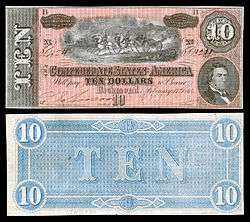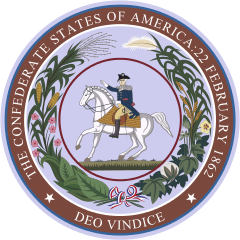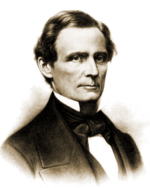Robert M. T. Hunter
| Robert Hunter | |
|---|---|
 | |
| President pro tempore of the Confederate States Senate | |
|
In office February 18, 1862 – May 10, 1865 | |
| Preceded by | Howell Cobb (President of the Provisional Congress) |
| Succeeded by | Position abolished |
| Confederate States Senator from Virginia | |
|
In office February 18, 1862 – May 10, 1865 | |
| Preceded by | Constituency established |
| Succeeded by | Constituency abolished |
| 2nd Confederate States Secretary of State | |
|
In office July 25, 1861 – February 18, 1862 | |
| President | Jefferson Davis |
| Preceded by | Robert Toombs |
| Succeeded by | William Browne (Acting) |
| United States Senator from Virginia | |
|
In office March 4, 1847 – March 28, 1861 | |
| Preceded by | William Archer |
| Succeeded by | John Carlile |
| 14th Speaker of the United States House of Representatives | |
|
In office December 16, 1839 – March 4, 1841 | |
| Preceded by | James Polk |
| Succeeded by | John White |
| Member of the U.S. House of Representatives from Virginia's 8th district | |
|
In office March 4, 1845 – March 4, 1847 | |
| Preceded by | Willoughby Newton |
| Succeeded by | Richard Beale |
| Member of the U.S. House of Representatives from Virginia's 9th district | |
|
In office March 4, 1837 – March 4, 1843 | |
| Preceded by | John Roane |
| Succeeded by | Samuel Chilton |
| Member of the Virginia House of Representatives | |
|
In office 1835–1837 | |
| Personal details | |
| Born |
Robert Mercer Taliaferro Hunter April 21, 1809 Loretto, Virginia, U.S. |
| Died |
July 18, 1887 (aged 78) Alexandria, Virginia, U.S. |
| Political party |
Whig (Before 1844) Democratic (1844–1887) |
| Spouse(s) | Mary Evelina Dandridge |
| Alma mater |
University of Virginia Winchester Law School |
Robert Mercer Taliaferro Hunter (April 21, 1809 – July 18, 1887) was a Virginian lawyer and politician. He was a U.S. Representative (1837–1843, 1845–1847), Speaker of the House (1839–1841), and U.S. Senator (1847–1861). During the American Civil War he was Confederate States Secretary of State (1861–1862) and then a Confederate Senator (1862–1865). After the war, he served as Treasurer of Virginia (1874–80), and customs collector in 1885 until his death.
Early life and education
Hunter was born in Loretto, Essex County, Virginia, the son of James Hunter and Maria (Garnett) Hunter.[1] He was a maternal first cousin of both Robert S. Garnett and Richard B. Garnett. He entered the University of Virginia in his seventeenth year and was one of its first graduates.[2] While he was a student, he became a member of the Jefferson Literary and Debating Society. He then studied law at the Winchester Law School, and in 1830 was admitted to the bar. From 1835 to 1837 he was a member of the Virginia House of Delegates.
Career
In 1837, Hunter was elected U.S. Representative as a States Rights Whig. He was re-elected in 1839, and became Speaker of the United States House of Representatives – the youngest person ever to hold that office. He was re-elected again in 1841, but was not chosen Speaker. In 1843 he was defeated for re-election.
He then changed parties, becoming a Democrat. In 1845, he was again elected Representative, and in 1846 was elected U.S. Senator, taking office in 1847. He was re-elected in 1852 and 1858.
In the Senate, he became chairman of the Committee on Finance in 1850. He is credited with bringing about a reduction of the quantity of silver in the smaller coins. He was the author of the Tariff of 1857 and of the bonded-warehouse system, and was one of the first to advocate civil service reform. In 1853 he declined President Millard Fillmore's offer to make him Secretary of State.


At the first session of the 1860 Democratic National Convention in Charleston, South Carolina, Hunter was a contender for the presidential nomination, but received little support except from the Virginia delegation. On seven of the first eight ballots, he was a very distant second to the leader, Stephen A. Douglas, and was third on the remaining 42 ballots. When the convention reconvened in Baltimore, most Southerners withdrew, including Hunter, and the nomination went to Douglas.
Hunter did not regard Lincoln's election as being of itself a sufficient cause for secession. On January 11, 1861, he proposed an elaborate but impracticable scheme for the adjustment of differences between the North and the South. When this and several other efforts to the same end had failed, he quietly urged his own state to pass the ordinance of secession. He was expelled from the Senate for supporting secession.
In July 1861, Hunter was appointed Confederate States Secretary of State. He resigned on February 18, 1862, having been elected a Confederate Senator. He served in the Confederate Senate until the end of the war, and was at times President pro tem.
As a Confederate Senator, he was often a caustic critic of Confederate President Jefferson Davis. Despite this friction, he was appointed by Davis as one of three commissioners sent to attempt peace negotiations in 1865, and met with President Lincoln at the Hampton Roads Conference. After Lee's surrender, Hunter was summoned by President Lincoln to confer regarding the restoration of Virginia.
When it was suggested by some Confederates that their slaves should be armed in order to win the war against the Union, Hunter vehemently opposed the move, delivering a long speech against it.[3]
From 1874 to 1880 he was the treasurer of Virginia, and from 1885 until his death was collector of the Port of Tappahannock, Virginia. He died near Lloyds, Virginia, in 1887.

Legacy
Hunter appeared in the 2012 film Lincoln, which included the Hampton Roads Conference. He was portrayed by Mike Shiflett.
Among his works was Origin of the Late War, about the causes of the Civil War.
In 1942, a United States Liberty ship named the SS Robert M. T. Hunter was launched. She was scrapped in 1971.[4]
Hunter was pictured on the Confederate $10 bill.[5]
References
- ↑ http://www.genealogy.com/ftm/w/a/g/Rick--Waggener/GENE3-0020.html
- ↑ University of Virginia. A Catalogue of the Officers and Students of the University of Virginia. Second Session, Commencing February 1, 1826. Charlottesville, VA: Chronicle Steam Book Printing House, 1880, p. 10.
- ↑ Escott, Paul D. (1992). After Secession: Jefferson Davis and the Failure of Confederate Nationalism. Baton Rouge, Louisiana: Louisiana State University Press. p. 254.
[F]or a great many of the most powerful southerners the idea of arming and freeing the slaves was repugnant because the protection of slavery had been and still remained the central core of Confederate purpose... Slavery was the basis of the planter class's wealth, power, and position in society. The South's leading men had built their world upon slavery and the idea of voluntarily destroying that world, even in the ultimate crisis, was almost unthinkable to them. Such feelings moved Senator R.M.T. Hunter to deliver a long speech against the bill to arm the slaves.
- ↑ "Southeastern Shipbuilding". shipbuildinghistory.com. Retrieved 2009-12-16.
- ↑ "Legendary Coins and Currency: Confederacy, 10 dollars, 1863". National Museum of American History. Retrieved 2011-08-11.
Further reading
- Anderson, Dice Robins (1906), "Robert Mercer Taliaferro Hunter", The John P. Branch historical papers of Randolph-Macon College, vol. 2 no. 2, pp. [4]-77
- Hunter, Martha T. (1903). A Memoir of Robert M. T. Hunter. Washington, DC: The Neale Publishing Company.
- Hunter, Robert M. T. (1918). Correspondence of Robert M. T. Hunter 1826-1876. Washington: American Historical Association.
- Patrick, Rembert W. (1944). Jefferson Davis and His Cabinet. Baton Rouge: Louisiana State University Press. pp. 90–101.
- Simms, Henry Harrison (1935). Life of Robert M. T. Hunter: a study in sectionalism and secession. Richmond, Va.: The William Byrd Press.
External links
| Wikimedia Commons has media related to Robert M. T. Hunter. |
| Wikisource has original works written by or about: Robert Mercer Taliaferro Hunter |
- Retrocession of Alexandria – A speech by R. M. T. Hunter before the U.S. House of Representatives, May 8, 1846
- United States Congress. "Robert M. T. Hunter (id: H000988)". Biographical Directory of the United States Congress. Retrieved April 29, 2009.
- "Robert M. T. Hunter". Find a Grave. Retrieved April 29, 2009.
![]() This article incorporates public domain material from the Biographical Directory of the United States Congress website http://bioguide.congress.gov.
This article incorporates public domain material from the Biographical Directory of the United States Congress website http://bioguide.congress.gov.
![]() This article incorporates text from a publication now in the public domain: Chisholm, Hugh, ed. (1911). "article name needed". Encyclopædia Britannica (11th ed.). Cambridge University Press.
This article incorporates text from a publication now in the public domain: Chisholm, Hugh, ed. (1911). "article name needed". Encyclopædia Britannica (11th ed.). Cambridge University Press.



